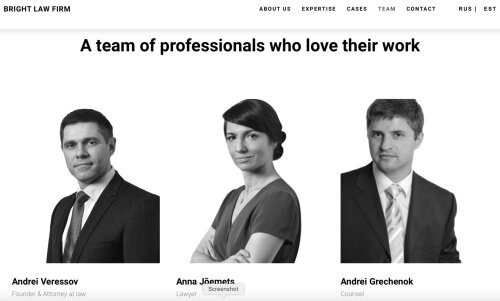Best Biotechnology Lawyers in Estonia
Share your needs with us, get contacted by law firms.
Free. Takes 2 min.
Or refine your search by selecting a city:
List of the best lawyers in Estonia
About Biotechnology Law in Estonia
Biotechnology in Estonia is a continually evolving field that encompasses the application of biological systems and organisms to develop or create different products. The sector is notably recognized for its potential to contribute to various industries, including healthcare, agriculture, and environmental protection. Estonia has been investing in biotechnological research and development, supported by its robust digital infrastructure and a supportive business environment. This has led to the establishment of various biotech companies and research institutions. The legal framework governing biotechnology in Estonia aims to balance innovation and ethical considerations, ensuring compliance with international standards while promoting growth in the field.
Why You May Need a Lawyer
Individuals or businesses involved in Biotechnology may require legal assistance for several reasons. Legal help may be needed for navigating intellectual property rights, as protecting your inventions and research is crucial. Compliance with regulations, such as those pertaining to clinical trials and biotech product development, is essential, requiring legal expertise. Additionally, partnerships or collaborations with other entities often necessitate legal agreements to protect interests and manage risk. Finally, in cases of disputes or litigation, a lawyer specializing in biotechnology can offer necessary representation and advice.
Local Laws Overview
Key aspects of local laws pertinent to biotechnology in Estonia include regulations on genetic engineering and safety protocols that align with European Union directives. Estonia's legislation covers areas such as patent law, ensuring the protection of biotechnological inventions. The country has strict guidelines on ethical considerations, particularly concerning medical research and experimentation on humans and animals. Additionally, Estonian environmental law incorporates biotechnological activity, particularly concerning the modification and handling of living organisms. Understanding these regulations is essential for anyone doing business in the biotechnology sector in Estonia.
Frequently Asked Questions
What is the process for obtaining a patent for a biotechnology invention in Estonia?
To patent a biotechnology invention in Estonia, you need to file an application with the Estonian Patent Office. The process involves preparing detailed technical documentation and proving the novelty of your invention. Estonia is part of the European Patent Convention, so you can also apply for a European Patent.
Are there any specific regulations for conducting clinical trials in Estonia?
Yes, clinical trials in Estonia must comply with both local and EU regulations. Approval from the State Agency of Medicines and an ethics committee is necessary. Stringent guidelines ensure participant safety and the ethical conduct of trials.
Can foreign companies operate in Estonia's biotechnology sector?
Yes, Estonia welcomes foreign investment in biotechnology. The e-Residency program and business-friendly policies make it easier for foreign entrepreneurs to establish and operate biotech companies in Estonia.
What environmental regulations affect biotechnology projects in Estonia?
Biotechnology projects in Estonia must comply with environmental laws that regulate the release and handling of genetically modified organisms (GMOs) and other environmental considerations. Compliance with national and EU environmental legislation is mandatory.
How does Estonia regulate genetically modified organisms (GMOs)?
Estonia regulates GMOs under strict EU guidelines, focusing on safety and environmental impact. Any activity involving GMOs requires a permit, following thorough risk assessments and public consultation.
What are the ethical considerations in biotechnology research in Estonia?
Ethical considerations in Estonia include informed consent, animal welfare, and the impact of biotechnological research on society and the environment. These are governed by ethical committees and national legislation.
Is there support for startups in the biotech industry in Estonia?
Yes, Estonia offers various incentives and support for startups, including grants, tax incentives, and support programs through organizations like Enterprise Estonia and the Estonian Development Fund.
How are intellectual property rights managed in collaborative biotech projects?
Collaborative biotech projects require well-drafted agreements that clearly define intellectual property rights and obligations of each party. Legal guidance is crucial to protecting all stakeholders' interests.
What kind of legal structure is ideal for a biotechnology company in Estonia?
The legal structure depends on business needs, but common structures include limited liability companies (OÜ) due to their flexibility and ease of management. Consultation with a legal expert will help determine the best structure.
Are there tax incentives for biotechnology firms in Estonia?
Estonia offers competitive tax incentives for businesses, including a zero percent corporate tax on reinvested profits, which can greatly benefit biotechnology firms focusing on research and development.
Additional Resources
For those seeking more information, the Estonian Biotechnology Association provides insight into industry developments and networking opportunities. Enterprise Estonia offers support for business ventures, and the Estonian Ministry of Economic Affairs and Communications oversees policy and administrative matters related to biotechnology. Additionally, the State Agency of Medicines offers guidance on clinical trials.
Next Steps
If you need legal assistance in the field of biotechnology in Estonia, it is advisable to consult with a lawyer experienced in both Estonian and international biotechnology law. Start by researching law firms that specialize in intellectual property, regulatory compliance, and international trade. Prepare a list of your needs and questions to bring to your consultation with the legal expert who can best address your specific concerns and guide you through the legal landscape.
Lawzana helps you find the best lawyers and law firms in Estonia through a curated and pre-screened list of qualified legal professionals. Our platform offers rankings and detailed profiles of attorneys and law firms, allowing you to compare based on practice areas, including Biotechnology, experience, and client feedback.
Each profile includes a description of the firm's areas of practice, client reviews, team members and partners, year of establishment, spoken languages, office locations, contact information, social media presence, and any published articles or resources. Most firms on our platform speak English and are experienced in both local and international legal matters.
Get a quote from top-rated law firms in Estonia — quickly, securely, and without unnecessary hassle.
Disclaimer:
The information provided on this page is for general informational purposes only and does not constitute legal advice. While we strive to ensure the accuracy and relevance of the content, legal information may change over time, and interpretations of the law can vary. You should always consult with a qualified legal professional for advice specific to your situation.
We disclaim all liability for actions taken or not taken based on the content of this page. If you believe any information is incorrect or outdated, please contact us, and we will review and update it where appropriate.
Browse biotechnology law firms by city in Estonia
Refine your search by selecting a city.














